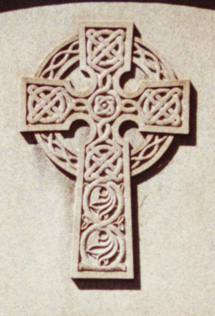 Once again the church stands at the doorway to the Tridiem, and once again we are met with the odd but familiar dialectical tension between cross and empty tomb, curse and blessing, Friday and Sunday. These two days, with a middle day of waiting and watching in between, are the time to slow down the Biblical narrative to such a pace that we are able to walk with its Central Character Christ through the twists and turns of redemptive history--the jagged details of Friday's death and the unspeakable newness of Sunday's raised-up life. We slow down the pace so that we are certain we have felt the full import of all three days--the suffering, the searching, and--mercifully--the salvation.
Once again the church stands at the doorway to the Tridiem, and once again we are met with the odd but familiar dialectical tension between cross and empty tomb, curse and blessing, Friday and Sunday. These two days, with a middle day of waiting and watching in between, are the time to slow down the Biblical narrative to such a pace that we are able to walk with its Central Character Christ through the twists and turns of redemptive history--the jagged details of Friday's death and the unspeakable newness of Sunday's raised-up life. We slow down the pace so that we are certain we have felt the full import of all three days--the suffering, the searching, and--mercifully--the salvation.I am prone to imagine that Friday and Sunday of this week come together as if a pair of theological hooks, hooks on which the church hangs its experience of living in a world after the raised life of the Christ but before the finalized life of his people. We are in-between people, those of us who look to the New Testament for light and life. We are in-between Sundays, and as such we are in need of two hooks on which we might secure our experiences of living as flimsy covenant people in a stubbornly broken world. Friday's cross, Friday's pain, Friday's abandonment form a hook on which we hang our own abandonments--our isolating sin, leading us away from God and abandoning such great grace; those sins enacted upon us which erode our relationships and threaten spoilage to the baptismal waters that have washed us. Friday is the day for the lonely, the oppressed, the wounded, the sinner, the mourner, the abused, the bored (the anxious), the angry. It is the day we hang our terrors and trials on the hook of Jesus' terror and trial. For now, without Friday, our gospel is triumphalistic, presumptive, arrogant, and a dangerous veneer. Without Friday, we presume too much when we say "Christ is risen!" As it has been observed, only the marooned who know of their isolation can readily appreciate news from another place when it comes. The accustomed inhabitants are uninterested, unable to appreciate the significance. For now, on this island, there is no unmitigated joy: Everything is tinged by Friday.
But (and in the New Testament, one notes, the arguments always turn on this simple, contrasting conjunction), there has been inserted into our Friday world another day. The dread of Friday has now been met by the grace of Sunday. Easter morning has, by the undomesticated word of God, inserted itself into the depths of Friday. Note well that Sunday is not the fruit of evolution, or of natural process, or of natural anything. Sunday is foreign, unexpected, external to the broken down dreams of Friday's loss. It is precisely, supremely "the day the Lord has made." He has made it, for it did not exist on its own after Friday's apparent failure. Externally it comes, bringing with it a new hook on which to hang our more buoyant moments.
Sunday is for faith. Sunday is for love. Sunday is for hope. And these three nouns are, in light of Easter, no longer merely generic religious abstractions: They are now concrete nouns and verbs, forged in and known by the lived life (and death) and Jesus, crucified yet raised. We do not wonder anymore how to faith (Oh for a verb! Trust?), how to hope, how to love. We no longer grope around in the dark trying to imagine these most basic Biblical actions. We look to the bright light of Easter's new day and we see them born out and made possible by Jesus' Friday-Sunday flight. In him do we see such faith, hope, and love. Through him do we learn how to trust, imagine, and agape. Easter is our classroom.
On this Sunday we hang our dreams. On this Sunday we hang our forgiveness, even as we are forgiven. On this Sunday we hang our hopes for a future in which God's will and way will (has!) once again insert itself into our broken down realities. Sunday gives us a glimpse of a time when we will finally jettison Friday's conspicuous hook, when no longer will we need a space in which to place our deathly moments, a hook-cross on which to hang them. Granted, that time has not yet been fully born among us, but surely we feel the labor pains, surely the hoping-for-it is itself a grace.
As it has been announced: For now, there is no pure joy. Everything is tinged by our Fridays. But now, also, there is now no pure sorrow, for every cross-moment is tinged with hope.
